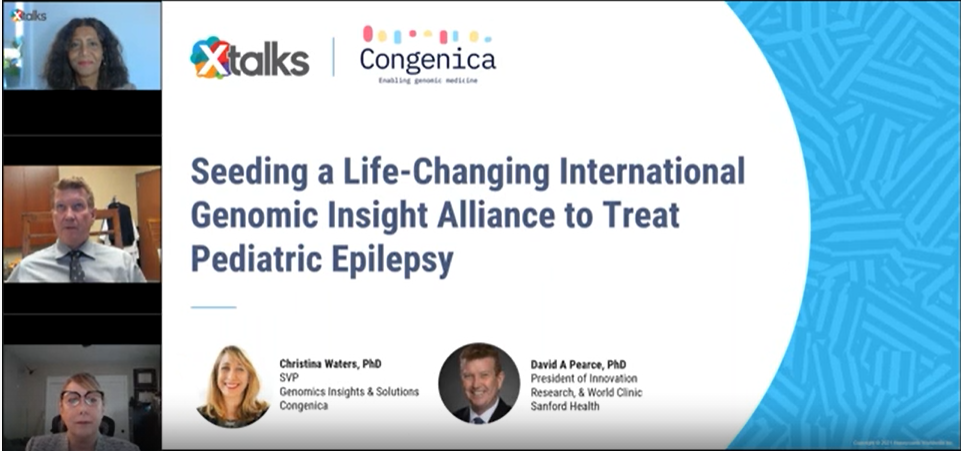Watch on demand
David A Pearce, PhD, President of Innovation, Research, & World Clinic at Sanford Health, and Christina Waters, PhD, SVP Genomics Insights & Solutions at Congenica, discuss the applications of genomics to the research and treatment of pediatric epilepsy and implications for wider R&D.
It is estimated that over 50 million people around the world suffer from epilepsy which can result from injury, health, environment, genetics and unknown causes. According to the World Health Organization (WHO), this makes epilepsy one of the leading global neurological diseases with 80% of people living in low- and middle-income countries. If the cause of epilepsy can be determined, it is also estimated that up to 70% of these individuals could be treated to prevent further adverse effects on cognition that has lifelong impact on the patients, care givers and health system. As a community, it is our responsibility to ensure access and equitability of knowledge and to continue to drive understanding and precision treatments for pediatric epilepsy.
As epilepsy can appear similar across individuals, the use of not only clinical differentiation but also genetic sequencing can aid in determining cause and treatment regimen. In the case of epilepsy with genetic etiology, there are multiple biological mechanisms that are associated, and it is imperative to determine individual cause for appropriate therapeutic intervention. Unfortunately, not all patients receive genetic testing and begin a test and fail journey of treatment until one works.
In addition, one-third of patients are non-responsive to existing treatments which necessitates the need for further understanding of the genetics and biology that cause some types of epilepsy. For both the existing therapeutics and those to be developed to address new biological mechanisms, there is a great need to develop precision targeted therapies to avoid secondary affects. There remains a lack of understanding of the biology, a data gap, standardized clinical protocols and treatment options for epilepsy that can be driven by genomic insights and alliances globally.
In partnership, Sanford Health and Congenica are working to drive forward genomic insights for pediatric epilepsy to address the challenges. This webinar explores the possible impact of integrating genetic sequencing into the clinic on case management and patient. In addition, the experts discuss the challenges of driving new knowledge around the biology of epilepsy along with new precision treatments. The aim of the Sanford Health System and Congenica partnership is to leverage learnings and model how implementation of this program can be used by Sanford Wellness Clinics in low- and middle-income countries, bringing equity and access globally. Lastly, the webinar highlights the importance of global implementation of standardized clinical protocols, through exploring how knowledge can seed programs and international alliances can broaden the diversity of data through a virtuous cycle of knowledge to treat pediatric epilepsy.
What you will learn:
- Clinical genomics’ value to case management, patient outcomes and research
- Possibility of standardized clinical protocols and value
- Equity and access for existing understanding of pediatric epilepsy for global impact
- Data sharing globally to reveal new biology to drive new precision therapies
- The need of data diversity and how to fill this gap

.png?width=320&height=192&name=Untitled%20design%20(8).png)
.png?width=320&height=192&name=Since%202016%2c%20the%20number%20of%20women%20working%20in%20STEM%20fields%20in%20the%20UK%20has%20increased%20by%20216%2c552%2c%20taking%20the%20total%20number%20over%20the%201%20million%20mark%20for%20the%20first%20time.%20Women%20now%20make%20up%2024%25%20of%20the%20STEM%20workforce%20i%20(2).png)
-1.png?width=320&height=192&name=Deciphering%20Developmental%20Disorders%20(1)-1.png)